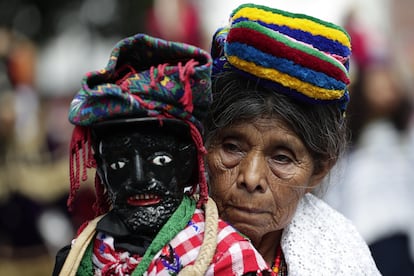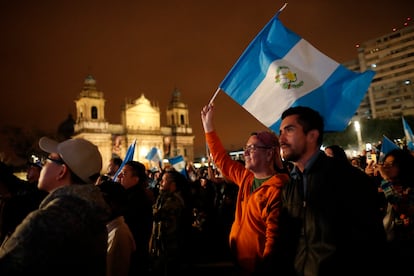Bernardo Arévalo sworn in as president of Guatemala after Congress delays investiture by nine hours
Citizens and international leaders supported the president-elect in the face of last-minute obstacles to prevent him from being sworn in


Bernardo Arévalo is finally the president of Guatemala. The president took the oath of office in a ceremony at the Miguel Ángel Asturias cultural center on Sunday. His path to the presidency has been so complicated that the investiture was plagued with uncertainty. The ceremony was scheduled for 3 p.m. (local time), but tensions and bickering in Congress delayed it for nine hours. These last-minute obstacles pushed the investiture back to midnight, and international guests, such as Spain’s King Felipe and Chilean President Gabriel Boric, had to leave before they could see the Seed Movement leader be sworn in.
After reaching an agreement on the composition of Congress’ board of directors after 10:30 p.m., the lawmakers traveled by bus to the cultural center to swear in Arévalo and his vice president, Karin Herrera. Arévalo received the presidential sash and the key to the Constitution from Samuel Pérez, another member of the Seed Movement. Pérez was elected president of the Congress of Guatemala — a big win for the Seed Movement, which managed to secure enough votes even though it is the third-largest party in Congress.

“Today, as a nation, we are making history. To address this call, we have a plan. There can be no democracy without social justice and social justice cannot prevail without democracy,” said Arévalo in his first speech as president. In his address, he highlighted the important role played by the four Indigenous peoples of Guatemala — the Maya, Xinka, Garifuna and Ladino — the international community, and institutions such as the Supreme Electoral Tribunal and the Constitutional Court in fulfilling the “desire of Guatemalans to live in democracy.”
Arévalo also acknowledged the “complex tensions and challenges” that he has been up against after winning the election. The efforts to derail his win sparked alarms about the authoritarian drift of Guatemala. “The world is being confronted by a wave of authoritarianism, the spread of intolerance, the restriction of dissent,” he argued in a nearly 25-minute speech. “We are facing new authoritarian phenomena such as the corrupt co-optation of state institutions by criminal groups that exploit their democratic appearance to betray the principles of liberty, equality, justice and fraternity on which they are founded. This is the struggle we are facing in Guatemala and elsewhere in Central America,” he insisted.
Born in Uruguay, Arévalo — the son of former Guatemalan president Juan José Arévalo (1945-1951) — achieved a surprise victory at the August elections with a campaign based on fighting corruption and curbing the rise of authoritarianism. But he is unlikely to have an easy time as president: the judiciary is against him, and his party is in the minority in Congress.
Indeed, it was Congress that stalled Arévalo’s investiture. What should have been a five-hour protocol act to swear in lawmakers and appoint Congress’s board of directors lasted for more than 12 hours due to delays and fights between deputies that even forced the Constitutional Court to intervene so that the process could go ahead.
While Congress raised uncertainty about whether they would finally be able to finish the necessary procedure for Arévalo’s investiture before midnight, as stipulated by law, there was growing tension on the streets and among the international delegations that arrived in Guatemala to witness the transfer of power.
Arévalo’s supporters arrived early in the morning in Guatemala City to take part in the celebrations planned in the emblematic Plaza de la Constitución. In response to the delays, they moved to Congress to demand that the deputies invest Arévalo. These calls were supported by Guatemala’s Indigenous communities, who have been holding a sit-in in front of the Public Ministry for 105 days to defend democracy against prosecutors’ efforts to disqualify Arévalo. They also called on the population of other territories to mobilize if necessary.
International complaints
“Deputies have the responsibility to respect the popular will expressed at the polls. They are trying to violate democracy with illegalities, inconsequential details and abuses of power,” Arévalo said in a message on social media after 4 p.m., when he saw that Congress was trying to derail the investiture ceremony. “The Guatemalan people and the international community are watching.”
The president spent hours waiting in a hotel in zone 10 of the capital, where his international guests were also present and increasingly concerned about the delays. They were also quick to issue warnings about Congress’ efforts to thwart the transfer of power.

“The prosecution has been the orchestrator of a coup d’état. Congress has made it difficult for the president-elect to take office,” said Colombian President Gustavo Petro on the social media network X, formerly Twitter. Petro said that he would not leave the country until Arévalo was sworn in as president, even if that meant missing the trip to Davos (Switzerland) to participate in the World Economic Forum.
Chilean President Gabriel Boric also showed his support for Arévalo, criticizing the “latest crude attempts by some sectors” to prevent him from taking office.
The international delegations present in Guatemala signed a document in support of the president and democracy that was read by the Secretary General of the Organization of American States (OAS), Luis Almagro, at around 5 p.m. “We call on the Congress of the Republic to comply with its constitutional mandate to hand over power as required by the Constitution today to president-elect Bernardo Arevalo and Karin Herrera,” said Almagro, who was accompanied by Spanish Minister of Foreign Affairs José Manuel Albares, Mexican Minister of Foreign Affairs Alicia Bárcena, the president of Costa Rica, Rodrigo Chaves, the vice president of Brazil, Geraldo Alckmin, and the high representative of the European Union for Foreign Affairs and Security Policy, Josep Borrell. Borrell also warned that he would propose to EU member states “the application of individual restrictive measures against members of Congress that prevent the transfer of powers.”
While Congress made its last-ditch attempts to derail the results of the elections, Guatemalans continued to firmly defend their democracy. Guatemala City’s emblematic Plaza de la Constitución — where the Seed Movement was born in the heat of the anti-corruption protests of 2015 — was filled with citizens who patiently waited for hours for the investiture. They celebrated and danced to the concerts planned for Arévalo’s investiture and finally, around 12:30 pm, breathed a sigh of relief when he was sworn in.
In his speech, Arévalo said that Guatemala was closing a “painful cycle of crisis and uncertainty.” To thank those who have supported him these months, Arévalo said he would go to the headquarters of the Public Ministry at 1.30 a.m. to greet the Indigenous movements who have been holding a sit-in, and then to the Plaza de la Constitución. It will be a tribute to a people that, as he said in his speech, “is offering to the world community an unexpected example of conviction and democratic resilience.”

Sign up for our weekly newsletter to get more English-language news coverage from EL PAÍS USA Edition
Tu suscripción se está usando en otro dispositivo
¿Quieres añadir otro usuario a tu suscripción?
Si continúas leyendo en este dispositivo, no se podrá leer en el otro.
FlechaTu suscripción se está usando en otro dispositivo y solo puedes acceder a EL PAÍS desde un dispositivo a la vez.
Si quieres compartir tu cuenta, cambia tu suscripción a la modalidad Premium, así podrás añadir otro usuario. Cada uno accederá con su propia cuenta de email, lo que os permitirá personalizar vuestra experiencia en EL PAÍS.
¿Tienes una suscripción de empresa? Accede aquí para contratar más cuentas.
En el caso de no saber quién está usando tu cuenta, te recomendamos cambiar tu contraseña aquí.
Si decides continuar compartiendo tu cuenta, este mensaje se mostrará en tu dispositivo y en el de la otra persona que está usando tu cuenta de forma indefinida, afectando a tu experiencia de lectura. Puedes consultar aquí los términos y condiciones de la suscripción digital.








































